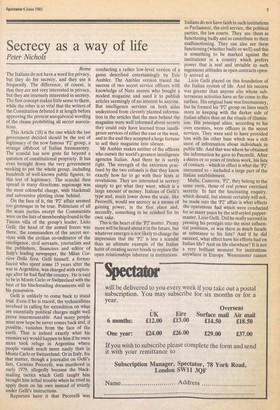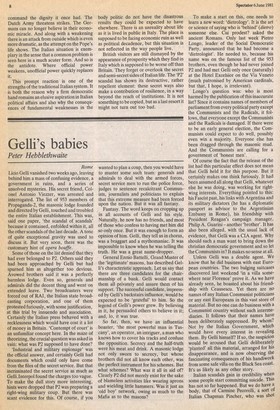Secrecy as a way of life
Peter Nichols
Rome The Italians do not have a word for privacy, but they do for secrecy, and they use it frequently. The difference, of course, is that they are not very interested in privacy, but they are intensely interested in secrecy. The first concept makes little sense to them, while the other is so vital that the writers of the Constitution debated it at length before approving the present unequivocal wording of the clause prohibiting all secret associations.
This Article (18) is the one which the last government decided should be the test of legitimacy of the now famous `P2' group, a strange offshoot of Italian freemasonry. The scandal has now gone far beyond a question of constitutional propriety. It has even brought down the very government *seeking to put the whole group, including hundreds of well-known public figures, to this test of legitimacy. The scandal then spread in many directions: espionage was the most colourful charge, with blackmail and subversive plotting close behind.
On the face of it, the `P2' affair seemed too grotesque to be true. Politicians of all the main parties except the Communists were on the lists of membership found in the Tuscan villa of the group's leader, Licio Gelli: the head of the armed forces was there, the commanders of the secret services with the civilian co-ordinator of the intelligence, civil servants, journalists and the publishers, financiers and editor of Italy's leading newspaper, the Milan Corriere Della Sera. Gelli himself, a former fascist who spent some 15 years after the war in Argentina, was charged with espionage after he had fled the country. He is said to be in Monte Carlo or Switzerland with the best of his blackmailing documents still in his possession.
Gelli is unlikely to come back to stand trial. Even if he is traced, the technicalities involved in calling for extradition on what are essentially political charges might well prove insurmountable. And many people must now hope he never comes back and, if possible, vanishes from the face of the earth. That is indeed exactly what his enemies say would happen to him if he once more took refuge in Argentina where people vanish much more easily than in Monte Carlo or Switzerland. Or in Italy, for that matter, though a journalist on Gelli's lists, Carmine Pecorelli, was murdered in early 1979, allegedly because the blackmailing tactics which Gelli taught him brought him lethal trouble when he tried to apply them on his own instead of strictly under Gelli's instructions.
Reporters have it that Pecorelli was conducting a rather low-level version of a game described entertainingly by Eric Ambler. The Ambler version traced the success of two secret service officers with knowledge of Nato secrets who bought a modest magazine and used it to publish articles seemingly of no interest to anyone. But intelligence services on both sides understood from cleverly planted information in the articles that the men behind the magazine were well informed about secrets they could only have learned from intelligence services of either the east or the west, and in the end they accepted a large fortune to sell their magazine into silence.
Mr Ambler makes neither of the officers who outwit the world's greatest intelligence agencies Italian. And there he is surely right. The strength of the extortion practised by the two colonels is that they know exactly how far to go with their hints at revelations. They are interested in secrecy simply to get what they want, which is a large amount of money. Italians of Gelli's type and, much lower down the scale, like Pecorelli, would see secrecy as a means of gaining power, in the first place and, secondly, something to be relished for its own sake.
This is the heart of the `P2' matter. Plenty more will be heard about it in the future, but whatever emerges is not likely to change the impression that the `132' is less a scandal than an ultimate example of the Italian habit of creating secret bonds to replace the open relationships inherent in institutions. Italians do not have faith in such institutions as Parliament, the civil service, the political parties, the law courts. They see Ithem as functioning badly and so contribute to their malfunctioning. They can also see them functioning (whether badly or well) and this is something to be marked against the institutions in a country which prefers power that is real and invisible to such ingenuous attitudes as open contracts openly arrived at.
Licio Gelli played on this foundation of the Italian system of life. And his success was greater than anyone else whose subterranean activities have so far come to the surface. His original base was freemasonry, but he formed his `P2' group on lines much more in keeping with the darker side of Italian affairs than on the rituals of illuminism. His principal allies, according to his own enemies, were officers in the secret services. They were said to have provided him with his other base which was a rich store of information about individuals in public life. And that was where he obtained the information he gave to Pecorelli. After a dozen or so years of tireless work, his lists of contacts — which in effect is what the `P2' amounted to — included a large part of the Italian establishment.
Mafia, Camorra, `P2', they belong to the same roots, those of real power exercised secretly. In fact the fascinating enquiry, which should, but almost certainly will not, be made into the `132' affair is what effects the operations had which were conducted for so many years by the self-styled puppetmaster, Licio Gelli. Did he really succeed in pressing his protégés into the most influential positions, or was there as much facade as substance to his lists? And if he did succeed, what effect have his efforts had on Italian life? And on life elsewhere? It is not a very brilliant moment for institutions anywhere in Europe. Westminster cannot command the dignity it once had. The Dutch Army threatens strikes. The Germans can no longer believe in their economic miracle. And along with a weakening there is an attack from outside which is even more dramatic, as the attempt on the Pope's life shows. The Italian situation is exemplary in the sense that a common problem is seen here in a much acuter form. And so is the antidote. Where official power weakens, unofficial power quickly replaces It.
This prompt reaction is one of the strengths of the traditional Italian system. It is both the reason why a firm democratic hand remains an elusive aspiration in Italian political affairs and also why the consequences of fundamental weaknesses in the body politic do not have the disastrous results they could be expected to have elsewhere. There is an unreality about life as it is lived in public in Italy. The place is supposed to be facing economic ruin as well as political decadence, but this situation is not reflected in the way people live.
British visitors are still dismayed by the appearance of prosperity which they find in Italy which is supposed to be worse off than Britain. They forget or overlook the secret and semi-secret sides of Italian life. The `P2' scandal has shown its destructive, rather repellent element: these secret ways also make a contribution of resilience, in a way beyond the reach of institutions. It is not something to be copied, but as a last resort it might not turn out too bad.











































 Previous page
Previous page